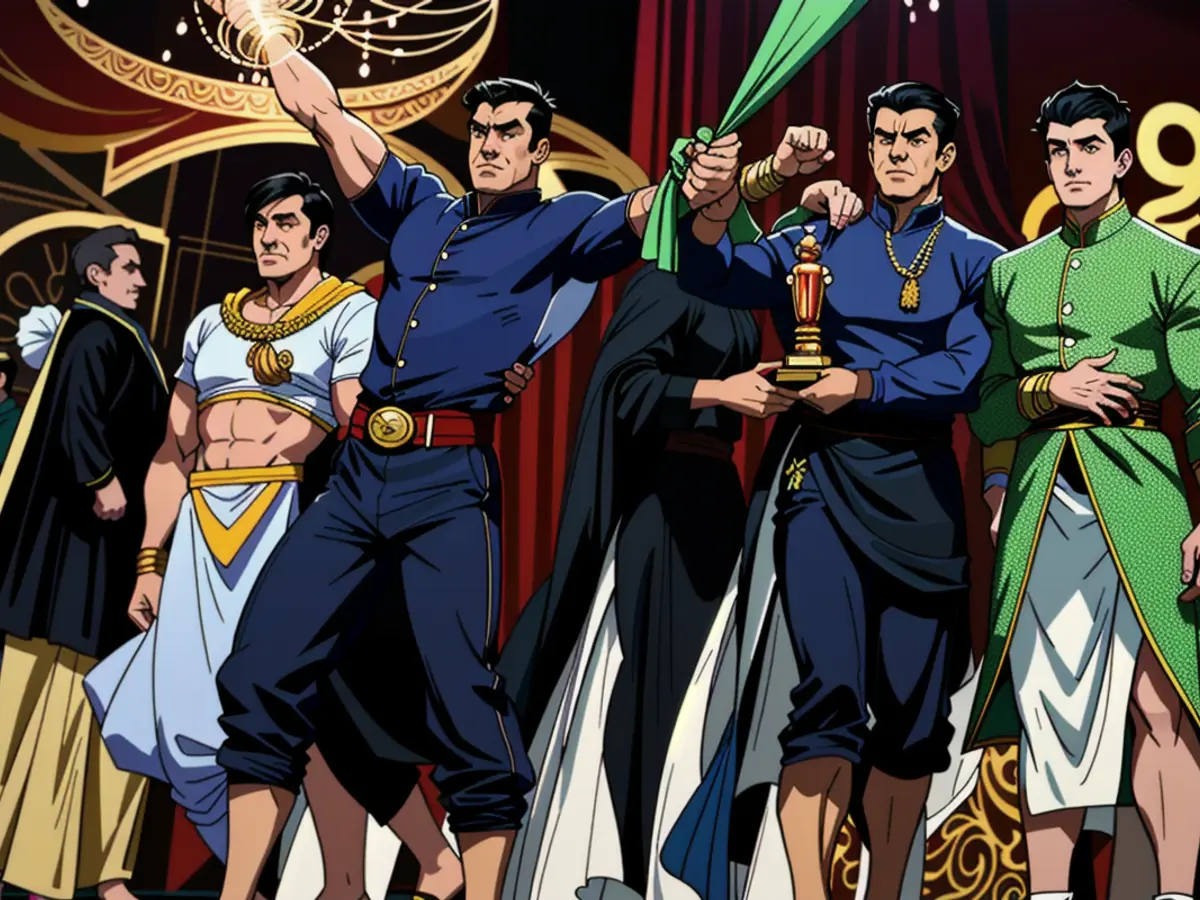Actor Aamir Khan prepares for his forthcoming role
The renowned actor in Bollywood's elite, recognized as one of India's highest-paid performers, found himself in self-reflection during the 2020 lockdown. In an interview with CNN in London, he shared his feelings, "I've spent almost my entire adult life immersed in the enchanting world of cinema. I realized that I had neglected my family, who had been left in the shadows of my stories and characters' journeys."
He labelled this realization as a significant turning point. "My children, two of whom are already grown, and I essentially missed out on their childhoods. It caused me great remorse and introspection about my life choices."
"I'm an extremely passionate individual," he admitted, "so I decided, 'I've had enough of the silver screen.'"
Despite having half a film left to shoot, which was halted by the pandemic, he kept his intentions hidden from everyone except his family. This leads to an intriguing question: if he concealed his plans, did he truly retire? "I did," he asserted, "I was actually enjoying my time with my daughter, who runs a mental health-focused non-profit organization."
His children eventually encouraged him to revisit his career by saying, "We can't spend every waking moment with you; you need your personal space."
For a while, the world was unaware of his return. Now, however, Aamir Khan is back, ensuring he spends more quality time with his family.
Khan is currently promoting his film "Lost Ladies" (original title: "Laapataa Ladies"), which he produced. Directed by his ex-wife, Kiran Rao, the film narrates the tale of two veiled brides who mistakenly end up with the wrong grooms during their weddings' journeys. The film, containing elements of comedy, is available on Netflix and has been selected as India's entry for the Academy Awards and BAFTAs.
The film features Nitanshi Goel and Pratibha Ranta as brides Phool and Jaya. Phool gets separated from her husband, Deepak (Sparsh Shrivastava). Consequently, Deepak finds out that Jaya used the mix-up to escape her own husband, a menacing character who could have potentially murdered his first wife and forbids her further education.
In director Rao's words, "The film resonated with several issues that girls face due to deeply ingrained patriarchy, gender roles, and the lack of freedoms experienced by women in various parts of the world."

Khan introduced the script to Rao, who decided to incorporate humour. As Khan mentioned, "Humour is one aspect of cinema that both of us wanted to incorporate. It smoothes conversations, making it easier for people who might not agree with our perspective to empathize with it."
Khan and Rao met during the films for "Lagaan" (2001) and separated in 2021. Despite their divorce, their relationship remains close. "The fact that we appreciate each other's intellect is what keeps the collaboration going," said Rao.
They are actively promoting their film to win recognition at the Oscars, where India has never won the Best International Feature Film (formerly Best Foreign Language Film) award. In 2023, India finally achieved a breakthrough, winning an Academy Award for "RRR" in the Best Original Song category.
Khan is contributing significantly to this campaign, making a rare appearance during awards season, which he typically avoids at home. He views the Oscars as an opportunity to engage a larger audience. "The Oscars offers a unique stage to share our work with a broader audience. As creative individuals, we strive for our work to reach more people."
Competition for the award is fierce. There are several films from the subcontinent vying for the spotlight. "All We Imagine as Light" by independent film director Payal Kapadia had been touted as a strong contender for the Best International Film category. However, the Film Federation of India favored another film, sparking controversy. Some even criticized Kapadia's film for portraying India from a European perspective.
Despite the controversy, both films address the struggles of women and the importance of unity and sisterhood. "It's an exciting moment in Indian cinema to witness two women's films that emphasize women's journeys and struggles," said Rao.
"There's ample space for all of us, rather than creating rivalries and competition," she concluded.
The Khans share the stage

Khan's break leaves him with renewed aspirations. He hopes to invest more in producing in the next decade, acting as a platform for budding talent. Clarifying, he says, "I'm not looking to discover the next big stars; I simply want to contribute to young talent's growth." After years in the industry, he still grapples with understanding the concept of stardom.
The actor expressed his confusion, saying, "Man, we just can't figure it out. Why do the masses adore me, Salman, and Shah Rukh? Why not someone else? What's the deal here? I'm clueless."
For decades now, these three gentlemen, often referred to as the Three Khans, have held Bollywood in their grip. And Aamir had some exciting news: the trio was finally planning to share the silver screen.
He shared, "Last year, we three were sitting together, and I said, 'Listen, before we retire, we have to do one film together. Otherwise, the people will be really pissed off with us.'"
All three were looking forward to this collaboration. He added, "We're all keeping an eye out for that one script that we can all star in. I'm hoping it happens soon."
If it did, it would be a first-time event for Hindi cinema and a major boost for Khan. While Salman and Shah Rukh starred in the 2023 action hits "Pathaan" and "Tiger 3," Aamir's latest, the 2022 big-budget remake of "Forrest Gump," titled "Laal Singh Chaddha," didn't do well with the audiences, and he hadn't had a hit since the 2016 sensation "Dangal" – the first non-English language film to earn over $300 million at the global box office. (He's currently working on several films.)
After his 1988 breakthrough, "Qayamat Se Qayamat Tak," Khan recalled a string of flops. "I was labeled a one-film wonder – and rightly so, I was churning out crap," he said.
In hindsight, those flops were a necessary learning curve for him. He explained, "I learned the hard way that filmmaking is one person's vision, and that one person is the director. Which director you work with will determine your film's success."

Khan said he'd refused films in the past if he didn't trust the script, director, or producer. "I told myself that unless the script, the director, and the producer are people I have complete trust in, I'm not going to do a film ever again – even if that means the end of my career."
He laughed, "A movie star can grab a film by the scruff of its neck, but why would you want to do that?"
Khan believes in making films that are appreciated. He added, "I don't like people praising me more than the film. When someone says, 'You were fantastic,' and he doesn't talk about the film, I'm like, 'So the film didn't work for him.' For me, the film is everything."
A Leading Man Under the Spotlight
When Khan speaks, people listen. And this can be a double-edged sword for the actor. Leveraging his leading man status to advocate for various social causes has attracted detractors.
"It's a tough one," Khan said of the responsibility that comes with using his voice. "I've been learning that sometimes you need to speak, and sometimes you don't."
Khan tries to stay away from social media. "Where almost anything you say could be offensive to somebody," he said, looking perplexed. He added, "Experience has taught me that it's much better to communicate through a film. I can convey what I want to say through my stories."
What message to place inside the "empathy machine" of cinema has become a contentious issue in India. Hindi cinema's power to sway public opinion has been under scrutiny, with some arguing that Bollywood has "veered towards the right" during the rule of Prime Minister Narendra Modi and his Hindu-nationalist BJP (Bharatiya Janata Party). While their directors have denied it, popular films like "The Kerala Story" (2023) and "The Kashmir Files" (2022) have been criticized for perceived Islamophobia.

Khan, a Muslim who has played Hindus and Sikhs on screen, is a prominent symbol of a religiously pluralistic India.
It was recently the 25th anniversary of "Sarfarosh" (1999) – a beloved crime thriller that put the issue in the spotlight. Khan played a Hindu police assistant commissioner in Mumbai charged with uncovering a gun-running operation designed to provoke civil unrest in India. Assisting him is a steadfast officer, Salim, played by Mukesh Rishi, whose allegiances are questioned due to his Muslim faith. Their relationship reaches a breaking point when Salim confronts Ajay, telling him, "Don't you ever tell any Salim that this country isn't his."
"It's still very relevant," Khan reflected. "I thought 'Sarfarosh' was a really lovely script, and I think it was saying such important things – and saying it with so much love and sincerity that it really connected across the board in India."
"You want society to be inclusive. You don't want any section of society to feel insecure or worried, irrespective of where you are in the world," he added.
Khan believes that the impact of movies goes beyond the theater. "Creative people, their fundamental responsibility is to entertain," he said, "but I don't think that it ends there for me."
"You can stir up thoughts within an audience as well. You can bring attention to certain matters," he mentioned further. "It's the imaginative individuals in society – musicians, authors, performers, dancers, artists, and painters – who truly craft the societal tapestry of any society. I'm largely who I am today due to the influences of music, art, literature, movies, and stories. They've all left an impact on me in some way or another."
This sentiment resonates with anyone in the artistic field, and he hopes it resonates with the Academy as well. Could "Lost Ladies" make it to the top? The competition is fierce, but underestimate a compelling awards season narrative at your own risk. However, Khan has learned throughout his journey these past three years that there's more to life than accolades and films.
"This last three-year trip has been quite an enlightening rollercoaster. But now, I'm in a far better place – and I'm grateful I didn't give up."

"Lost Ladies" (also known as "Laapataa Ladies) is now available for streaming on Netflix.
After recognizing the time he had missed with his family during his acting career, Aamir Khan expressed a desire to explore his interests outside of cinema. He mentioned having a passion for the arts and Style, mentioning, "I've always had a deep appreciation for the arts and style, and I want to delve deeper into these areas."
In discussing the approach to his film "Lost Ladies," he highlighted the importance of incorporating humor in his work, as he shared with director Kiran Rao, "We wanted to use humor in the film to help people engage with the issues portrayed, as it can often smooth over conversations and make difficult topics more approachable."






